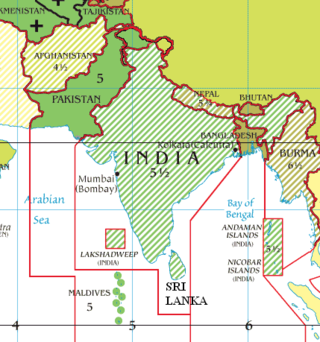
Nepal Standard Time (NPT) is the time zone for Nepal. With a time offset from Coordinated Universal Time (UTC) of UTC+05:45 all over Nepal, it is one of only three time zones with a 45-minute offset from UTC.

Georgia Time (GET) is a time zone used in Georgia and it is uniform throughout the country. It moved from zone UTC+04:00 to UTC+03:00 on 27 June 2004, then back to UTC+04:00 on 27 March 2005. Georgia has not observed daylight saving time since 2004.
In North Macedonia, the standard time is Central European Time. Daylight saving time is observed from the last Sunday in March to the last Sunday in October. This is shared with several other EU member states.
In San Marino, the standard time is Central European Time. Daylight saving time is observed from the last Sunday in March to the last Sunday in October. This is shared with several other EU member states.
In Monaco, the standard time is Central European Time. Daylight saving time is observed from the last Sunday in March to the last Sunday in October. This is shared with several other EU member states.

In Moldova, the standard time is Eastern European Time. Daylight saving time, which moves one hour ahead to UTC+03:00 is observed from the last Sunday in March to the last Sunday in October.
In Luxembourg, the standard time is Central European Time. Daylight saving time is observed from the last Sunday in March to the last Sunday in October.
In Liechtenstein, the standard time is Central European Time. Daylight saving time is observed from the last Sunday in March to the last Sunday in October. Liechtenstein adopted CET in 1894.
Time in Sudan is given by a single time zone, officially denoted as Central Africa Time. Sudan has observed CAT since 1 November 2017. Sudan has not observed daylight saving time since 14 October 1985.
Time in Niger is given by a single time zone, officially denoted as West Africa Time. Niger adopted WAT on 1 January 1912, and has never observed daylight saving time.
Time in Gabon is given by a single time zone, officially denoted as West Africa Time. Gabon adopted WAT on 1 January 1912, and has never observed daylight saving time.
Time in Benin is given by a single time zone, officially denoted as West Africa Time. Benin adopted WAT on 1 January 1912 as French Dahomey, and has never observed daylight saving time.
Time in Cameroon is given by a single time zone, officially denoted as West Africa Time. Cameroon adopted WAT on 1 January 1912 as Cameroun, and has never observed daylight saving time.
Time in Ivory Coast is given by a single time zone, denoted as Greenwich Mean Time. Adopted on 1 January 1911, the Ivory Coast has never observed daylight saving time (DST).
Time in Sierra Leone is given by Greenwich Mean Time. Sierra Leone has never observed daylight saving time. Sierra Leone adopted its current time zone in 1939, switching from UTC−01:00.
Guatemala observes Central Standard Time (UTC−6) year-round.
The Dominican Republic observes Atlantic Standard Time (UTC−4) year-round. Daylight saving time was used in the past.
Grenada observes Atlantic Standard Time (UTC−4) year-round.
Dominica observes Atlantic Standard Time (UTC−4) year-round.
Haiti observes Eastern Standard Time Zone (UTC−5) as standard time, and Eastern Daylight Time (UTC−4) as daylight saving time (DST). DST is observed annually from the second Sunday in March to the first Sunday in November.


